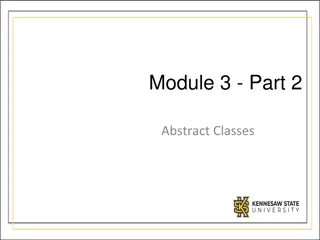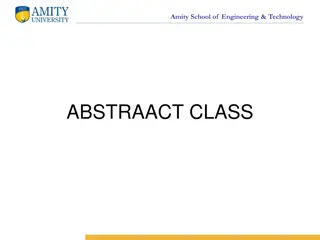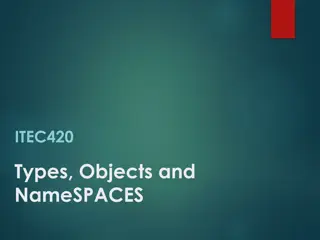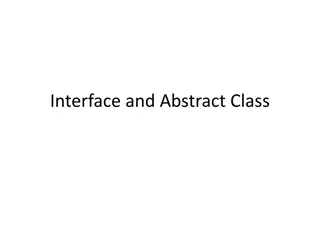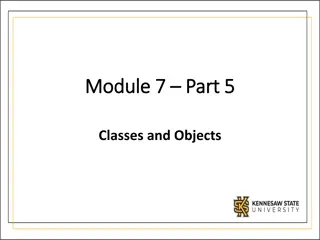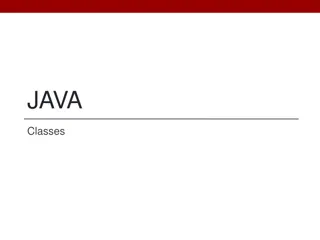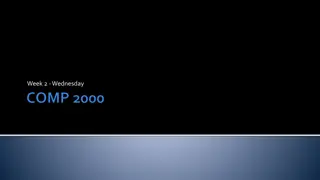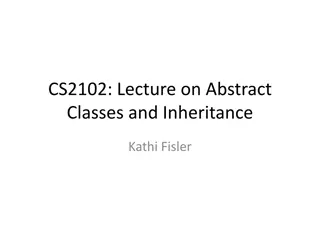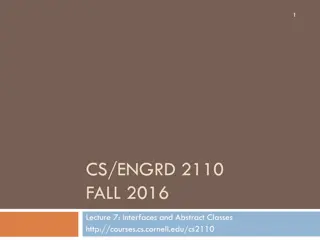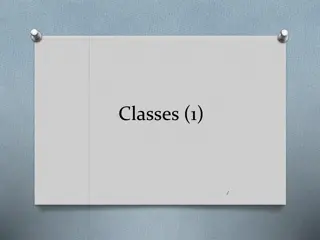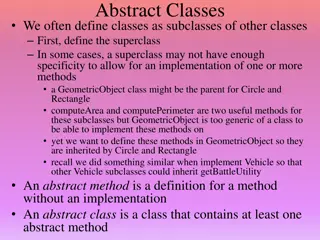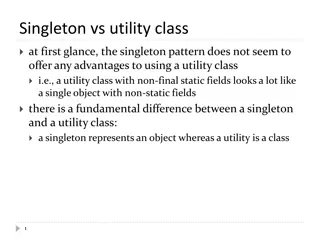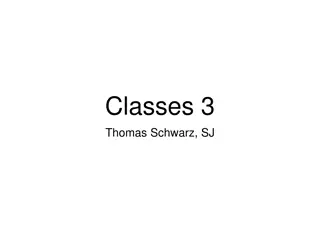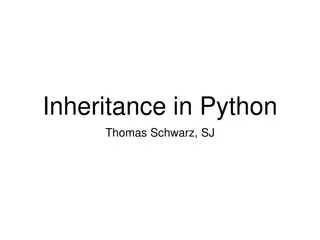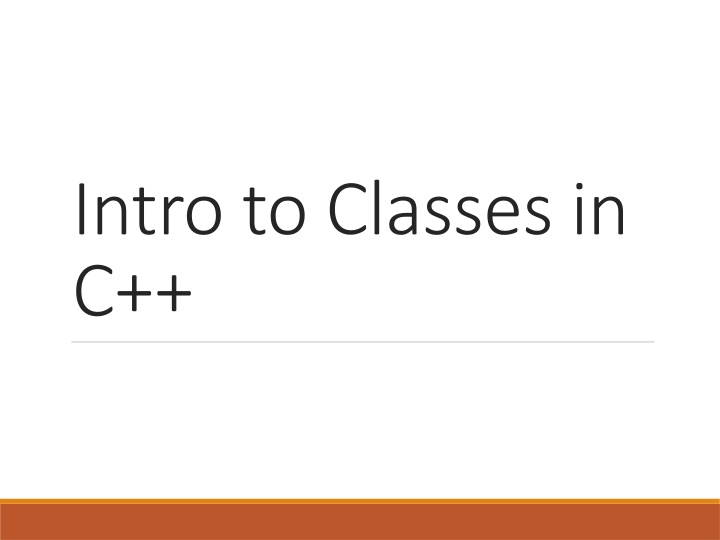
Classes in C++ Programming
Learn about classes in C++, including member variables, methods, constructors, destructors, syntax, access specifiers, constructors, and more. Discover the similarities and differences between C and C++ when working with classes.
Download Presentation

Please find below an Image/Link to download the presentation.
The content on the website is provided AS IS for your information and personal use only. It may not be sold, licensed, or shared on other websites without obtaining consent from the author. If you encounter any issues during the download, it is possible that the publisher has removed the file from their server.
You are allowed to download the files provided on this website for personal or commercial use, subject to the condition that they are used lawfully. All files are the property of their respective owners.
The content on the website is provided AS IS for your information and personal use only. It may not be sold, licensed, or shared on other websites without obtaining consent from the author.
E N D
Presentation Transcript
Classes Programmer-defined types Made up of members Variables Functions called methods when part of a class Constructors: Initialize the class Destructors: Clean up as the class is being removed/ deleted Concept is the same as C#, Java, etc. Where C-structs have only variables, C++ classes are complete objects with methods plus data Still use .h files for defining ; Use .cpp or .cc files for implementation
Syntax, semantics and concepts While C syntax can be used, C++ class and object syntax can be quite different Similarities: Differences: - include (.h) files define the class structure only - .cpp files implement the classes (sometimes .cc files) - new and delete (vs. malloc and free) - Abstract classes as templates - public/ private/ protected variables and methods - constructors and destructors - override and virtual methods - inheritance and polymorphism - streams for I/O (e.g. cout vs. printf ) - namespaces for scope - iterators [And g++ compiler in Linux] - include files - Basic if/ then/ else/ while control structures - Must still manage your own memory (but now for objects as well as data) - Can actually write typical C code (and not use C++ enhancements)
Class Declaration Point.h Generally declared in a header file Separate declaration and definition Allows multiple files to #include declaration Starts with class keyword Capitalized by convention class Point { }; // Notice the semicolon!
Class Access Specifiers By default, all class members are private Change with access specifiers public [visible to everyone] private [visible only to the original class] protected [visible to the original class and derived classes] Usage is different from C# / Java Define sections with specified access
Access Specifier Example class Point { public: // All public members here // As many as you want private: // All private members here // As many as you want int x; int y; };
Constructors Code to be run when object is created Ideally gives all variables useful values Constructs the object Called automatically when object is created Can have zero parameters Default constructor Can require parameters
Constructor Declaration class Point { public: Point(); // Default Constructor Point(int x, int y); // Constructor private: int x; // Member variable int y; // Member variable };
Methods Functions declared as class members Member functions Methods have access to other class members Other methods Variables Methods can use this keyword A pointer to this object More on pointers & objects soon
Method Example class Point { public: Point(); // Default Constructor Point(int x, int y); // Constructor int GetX(); // Method int GetY(); // Method private: int x; // Member variable int y; // Member variable };
Class Implementation Point.cpp Generally defined in a .cpp file #include associated header file Should define code of all members Methods Constructors Destructors No class keyword in .cpp file! Must use scope operator
Point.cpp - Example Part 1 #include Point.h" // Constructors Notice class name before :: Point::Point() { x = 0; y = 0; } Point::Point(int x, int y) { // More on the -> soon this->x = x; this->y = y; }
Point.cpp - Example Part 2 // The rest of the file // Methods Again, class name before :: int Point::GetX() { return x; } int Point::GetY() { return y; }
Remember this? - Memory Organization The call stack grows from the top of memory down. Function Call Frames The Stack sp Code is at the bottom of Similar in C++ The stack now holds local objects as memory. well as data Dynamic alloation for objects (and data) is from the heap Available for allocation The Heap Global data follows the code. What's left the "heap" - is available for allocation. Global Variables When you declare a pointer int *pInt; It is pointing to NOTHING You need to create a valid chunk of memory, and assign the pointer to that valid memory Binary Code 0
RAII Resource Acquisition Is Initialization - Objects Own Resources - Constructor is automatically called for initialization - Where an object goes out-of-scope (e.g. end of a method), it s destructor is automatically called Also called when you delete an object - The object is then responsible for releasing its own resources This is C++ s way of a more memory safe object management framework (without garbage collection)
Lifecycle //create the object MyClass *pObject = new MyClass(); . //Do stuff with the object (call methods etc) delete pObject; //destroy the object constructor Object lifecycle destructor
Instantiating Objects of a Class Objects are instances of a class Can be on the stack or the heap Just like arrays & other variables Many syntax options for creating objects
For example class widget { private: int* data; public: widget(const int size) { data = new int[size]; } // acquire ~widget() { delete[] data; } // release void do_something() {} }; void functionUsingWidget() { widget w(1000000); //lifetime automatically tied to enclosing scope //constructs w, including the w.data member w.do_something(); } // automatic destruction and deallocation for w and w.data
Objects on the Stack int main() { // Call constructors, but not saved in variables Point(); // Default constructor Point(5,5); // Parameterized // Variables Point p1; // Default Point p2(); // NEITHER! Point p3(5, 5); // Parameterized Point p4 = Point(); // Default Point p5 = Point(5, 5); // Parameterized }
Whats Wrong With This? What s wrong with this line: Point p2(); Looks like it should call default constructor Technically a function declaration A function named p2, which returns a Point Yes, even though it s in the main!
Objects on the Heap // Remember: new returns a pointer! int main() { // Call default constructor Point* p6 = new Point; Point* p7 = new Point(); // Call parameterized constructor } Point* p8 = new Point(5,5);
Destructors time to clean up // Called when the object is destroyed (stack or delete)! Point::~Point() { if (pObject) class Point { { public: delete pObject; Constructor Point(); // Default pObject = nullptr; ~Point(); // Destructor } private: }; MyObject* pObject; };
Calling Methods Local Variables Can call methods once you have an object Local variable method syntax is simple: // Create a point Point p = Point(5, 5); // Get the x value int x = p.GetX( );
Calling Methods - Pointers Not as straight-forward Can t call a method on a memory address Must dereference first, then call method Or use the arrow operator: ->
Calling Methods - Pointers // Create a new Point, get a pointer to it Point* p = new Point(5, 5); // Dereference and call int x = (*p).GetX( ); // Or use -> syntax // Essentially dereference and call int y = p->GetY( );
Creating Classes/ Building Basically, you need two files .h file: Sets up basic class declaration & definition .cpp (or .cc) implementation/ code Compiling - Same as C i.e. gcc or g++ and Makefile

